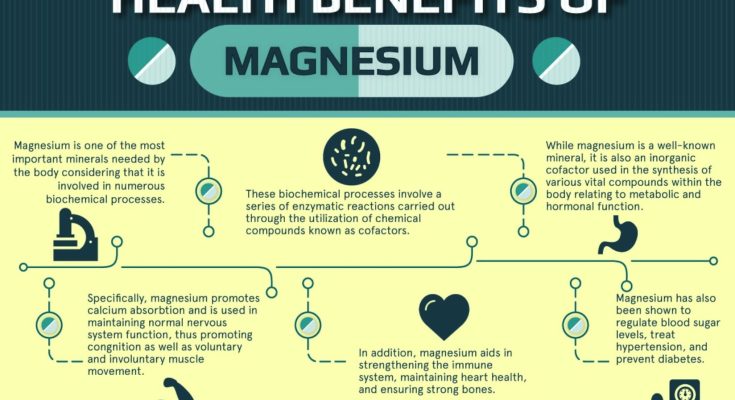In the vast and intricate biochemical symphony that plays out within our bodies, countless minerals act as essential cofactors, orchestrating a myriad of vital processes. Among these, magnesium often emerges as a true unsung hero, participating in over 300 enzymatic reactions that are fundamental to human health. Despite its ubiquitous presence in cellular functions, magnesium deficiency is surprisingly common in modern society, often due to depleted soil nutrients, processed food consumption, and certain lifestyle factors. Understanding the pervasive and profound role of this unassuming mineral can unlock significant avenues for improving overall well-being, influencing everything from muscle and nerve function to energy production and mental health.
Perhaps the most widely recognized function of magnesium is its indispensable role in muscle and nerve function. It acts as a natural calcium blocker, helping muscles to relax after contraction. Without sufficient magnesium, calcium can overstimulate muscle cells, leading to cramps, spasms, twitches, and even restless leg syndrome. This applies not only to skeletal muscles but also to the smooth muscles found in our blood vessels, making magnesium crucial for cardiovascular health. Similarly, magnesium is vital for nerve transmission, helping to regulate the flow of ions across nerve cell membranes. A deficiency can lead to heightened nerve excitability, manifesting as anxiety, irritability, and even tremors. For an individual experiencing persistent muscle cramps or inexplicable nervous tension, adequate magnesium intake could offer a significant and often overlooked solution.
Beyond its direct involvement in muscle and nerve activity, magnesium plays a critical role in energy production within every cell of the body. It is essential for the activation of adenosine triphosphate (ATP), often referred to as the body’s primary energy currency. Magnesium binds to ATP, making it biologically active and allowing it to fuel cellular processes. Without sufficient magnesium, our cells cannot efficiently generate the energy needed for everything from muscle contraction and nerve impulses to protein synthesis and DNA repair. This explains why fatigue and low energy are common symptoms of magnesium deficiency. Imagine a complex manufacturing plant; without a crucial component in its energy-generating machinery, the entire operation slows down. Magnesium is that essential component for our cellular powerhouses.
The impact of magnesium extends significantly to bone health, working synergistically with calcium and Vitamin D. While calcium is lauded as the primary mineral for bone density, magnesium is equally vital, participating in the activation of Vitamin D and regulating calcium levels in the body. It helps convert Vitamin D into its active form, which is then necessary for calcium absorption. Furthermore, magnesium directly influences the activity of osteoblasts and osteoclasts, the cells responsible for building new bone and breaking down old bone, respectively. Adequate magnesium intake is thus crucial for maintaining bone strength and density throughout life, contributing to the prevention of osteoporosis and fractures.
Magnesium’s influence on cardiovascular health is also profound and multi-faceted. It helps regulate blood pressure by promoting the relaxation of blood vessels, thereby reducing vascular resistance. It also plays a role in preventing arterial calcification, a process that can lead to hardening of the arteries and increased risk of heart disease. Furthermore, magnesium helps maintain a regular heartbeat and is involved in the electrical stability of the heart muscle. Studies have consistently shown an inverse relationship between magnesium intake and the risk of hypertension, stroke, and coronary artery disease. For individuals concerned about heart health, ensuring sufficient magnesium is a strategic dietary consideration.
Perhaps one of the most exciting and increasingly recognized roles of magnesium is its contribution to mental well-being and stress management. Magnesium has calming effects on the nervous system. It helps regulate neurotransmitters like serotonin, which contributes to feelings of well-being, and it binds to GABA (gamma-aminobutyric acid) receptors, which are inhibitory neurotransmitters that promote relaxation and reduce anxiety. Chronic stress depletes magnesium stores in the body, creating a vicious cycle where stress leads to magnesium deficiency, which in turn exacerbates stress and anxiety. Supplementing with or increasing dietary magnesium can help break this cycle, fostering a greater sense of calm, reducing symptoms of anxiety and depression, and even improving sleep quality.
Considering its widespread importance, how can one ensure adequate magnesium intake? Rich dietary sources include dark leafy green vegetables (like spinach and kale), nuts (almonds, cashews), seeds (pumpkin, chia, flax), legumes (beans, lentils), whole grains (brown rice, oats, quinoa), dark chocolate, and avocados. Unfortunately, modern agricultural practices have often depleted magnesium levels in soil, meaning that even a diet rich in these foods might not always provide optimal amounts. Furthermore, factors like chronic stress, certain medications, excessive alcohol consumption, and gastrointestinal issues can increase magnesium excretion or reduce absorption.
For many, dietary intake alone may not suffice, necessitating supplementation. Various forms of magnesium supplements exist, each with different bioavailability. Magnesium citrate is a common and well-absorbed form, while magnesium glycinate is often favored for its calming properties and lower likelihood of causing digestive upset. Magnesium L-threonate is gaining attention for its ability to cross the blood-brain barrier, making it potentially beneficial for cognitive function and mood. It is always advisable to consult with a healthcare professional before starting any supplementation, to determine appropriate dosages and rule out potential interactions with other medications or health conditions.
In conclusion, magnesium is far more than just another mineral; it is a fundamental pillar of human health, silently supporting hundreds of biochemical processes that are vital for our physical and mental well-being. From powering our cells and strengthening our bones to calming our nerves and protecting our hearts, its ubiquitous influence is undeniable. In an age where deficiency is prevalent, recognizing the profound role of magnesium and proactively ensuring adequate intake through diet and, if necessary, strategic supplementation, represents a powerful and accessible strategy for fostering optimal health and unlocking greater vitality in our daily lives.




